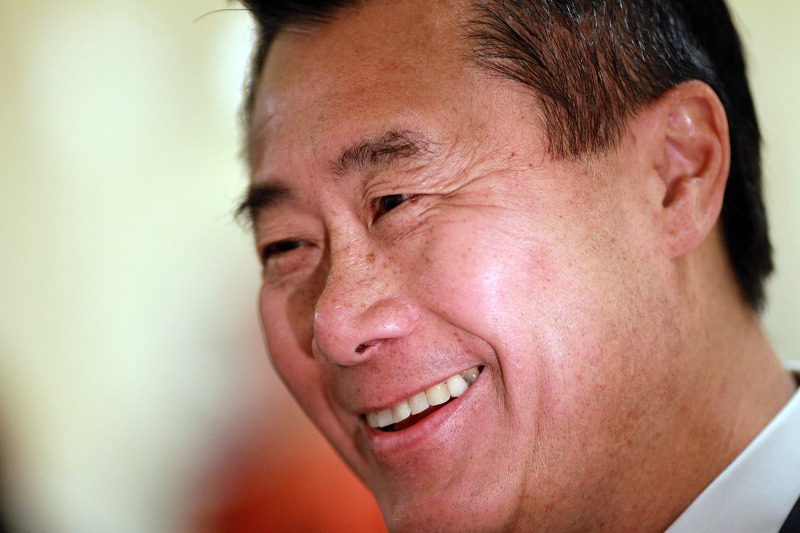Response: Agent 'Brilliantly Hooked' Yee Associate
The 35-page response by Lassart -- also embedded below -- suggests that while Yee accepts responsibility for his actions, he was steered into an impossible legal position by an undercover FBI agent who "brilliantly hooked and secured" Yee's co-defendant, San Francisco political consultant Keith Jackson.
In the 2014 federal complaint against Yee and Jackson -- filed in conjunction with the racketeering investigation into now-convicted Chinatown crime boss Raymond "Shrimp Boy" Chow -- prosecutors said the pair sought a series of bribes from undercover agents and engaged in extortion as they tried to retire the debt from Yee's unsuccessful 2011 run for mayor and to raise funds for his 2014 campaign for California secretary of state.
Lassart says that one of those agents, whom he repeatedly describes as "extremely skillful," essentially turned Jackson into his employee. Jackson, in turn, was unwittingly put to work entangling Yee in influence-peddling schemes and an arms-trafficking deal. Yee's participation, Lassart argues, was indirect.
In their memo, prosecutors dismiss the notion that Yee was not an active participant in the crimes to which he's pleaded guilty. They describe Yee as "a manipulative schemer" who had Jackson act as the front man for his dealings with the agents in an attempt to insulate himself from responsibility:
"Yee may argue to the court ... that much of the time he was unwitting as to what Jackson was doing with and saying to the undercover agents. Yee may argue he was out of the loop and did not authorize Jackson to speak for him. ... However, the overwhelming evidence, as found in the recordings of Yee himself, demonstrates that Jackson consulted with him about all conversations with the undercovers pertaining to Yee, took instructions from Yee, and did Yee’s bidding."
In arguing for a lighter sentence than the eight years sought by prosecutors, Lassart points to Yee as a man of "exemplary character" who has performed "exemplary service to the community."
After a career spent as a child psychologist, youth advocate and public school proponent, Lassart says, Yee went on to the Legislature, where he "fought for children, mental health services, working families, seniors, education, open government, consumer protection, civil rights, and the environment."
Altruistic or Cynical?
Lassart's filing notes Yee's legislation to aid victims of domestic violence, bills that won plaudits from several women's organizations. The government memorandum goes out of its way to suggest Yee's activity on behalf of women was "cynical, rather than altruistic."
The memo cites an intercepted 2013 conversation with an unidentified male in which Yee mentioned a human-trafficking bill he had sponsored. The document says Yee and the other man discussed -- "perhaps jokingly" -- visiting prostitutes in San Mateo. Yee asked whether the women were "human trafficked in there" and mentioned his pending legislation.
After the other man said, "It happens all over the place," the prosecutors' memo quotes Yee as saying, “Shit, man, do you think I care, man? All I care about is that the women love me. That’s all I care. I don’t care if it works, the bill works or not, so long as the women think I support women, that’s all I care about.”
The prosecution document also alleges that Yee "took advantage" of a woman constituent, identified only as "Friend A," who came to him for help with a personal problem:
Friend A told the FBI that at a booth at a festival in 2012, she saw a pamphlet about Yee that referred to domestic violence. She believed that Yee might be able to assist her with court proceedings involving custody of her young daughter. Friend A returned to the festival the next day and saw Yee at the booth. She began to cry when she told Yee about her situation. Yee asked how he could reach her and she provided her cell number.
When she got home, there were already two messages from Yee. In one, he said he was coming to see her and wanted her home address. Friend A called Yee and told him the next day was more convenient. Yee asked what time her children went to bed, and ended up coming to Friend A’s home later that night. Friend A told the FBI that when they met at her home that evening, Yee told her he would try to help and then kissed her. She reported that from that point on, the relationship was sexual.
Yee proceeded to assist Friend A by referring her to an attorney. He also loaned her $10,000 in cash. Friend A used half of the money for an attorney, and still had the remainder when Yee was arrested. She told the FBI she felt the money was “dirty money” and used it to pay off debts. Friend A reported that she felt used by Yee, and when he got angry, he would ask for the money back. She said this scared her because she had ongoing court proceedings. Friend A told the agents she felt taken advantage of, but needed help and was very grateful to Yee. She felt she had no one else to turn to and her daughter was safe because of Yee.
An objective view of these events suggests that Yee took advantage of a constituent who was vulnerable and in need for his own selfish purposes.
Yee, Jackson and two other defendants are scheduled to be sentenced next Wednesday.

